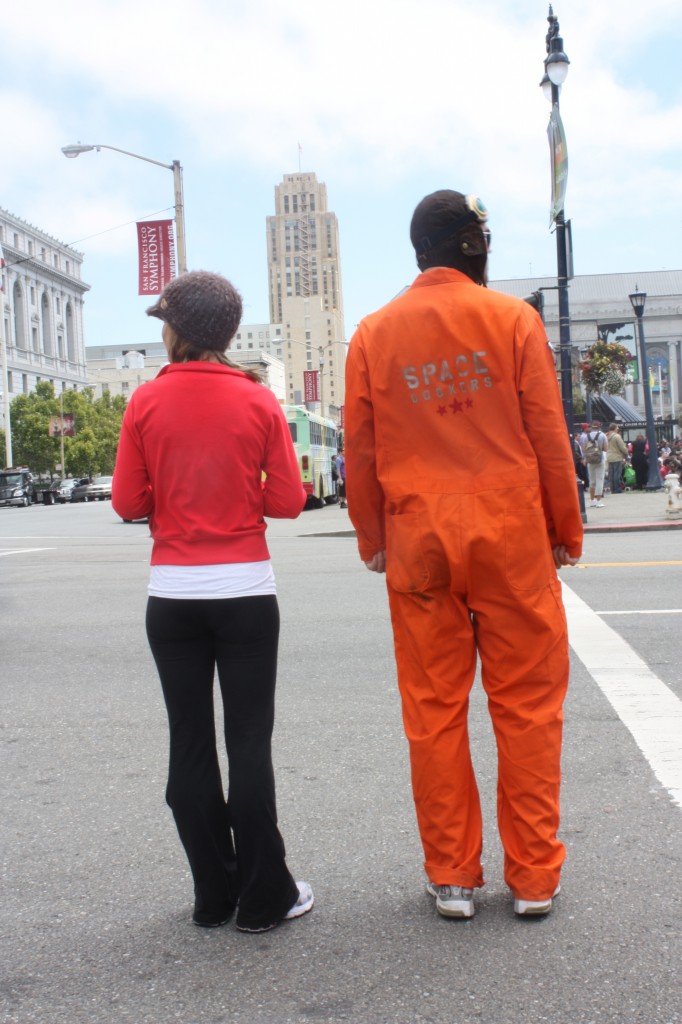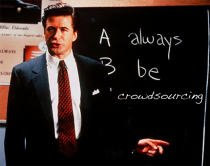The World Cup Goes Digital via Social Media
 Two fans sport their respective team colors at the final match. Image credit: Wendy Qi SAN FRANCISCO, CA: In the 48,000-seat Nelson Mandela Bay Stadium in South Africa, the crowd went wild as Dutch middle-fielder Wesley Sneijder nudged in a game-changing second goal, giving the Dutch their first win over five-time FIFA World Cup champion Brazil since 1974. Online, fans flooded their statuses with updates like “ORANJE!!!” — the nickname of the Dutch soccer team — sending microblogging site Twitter’s servers into overload and leading to a complete outage of the site for about half an hour.In a World Cup of several defining firsts, including a historic Spanish victory over the Dutch team in Sunday’s finals, the recently concluded 19th World Cup was also the first time that a critical mass of fans was able to share in their chosen team’s triumphs and losses, regardless of geographical location.
With Twitter and Facebook leading the way, this year’s World Cup marked the first time a maturing social media industry is making its debut on the global scene. “Social media didn’t invent conversation but it organizes and surfaces them so we can get a glimpse of how society is responding,” said Brian Solis, founder of Future Works, a digital and social media agency. During the 2006 World Cup, Twitter was a barely launched concept in the works and Facebook was a social network that had only recently opened up access beyond universities and colleges to high schools and certain companies in the United States. Today, Twitter, which allows users to post status updates within 140-character limits, boasts over 124 million accounts and Facebook is a network of over 400 million active global users. While public social networking outlets like MySpace, which was then the largest social network in the world, were available, none had the interactive reach that Twitter has been able to deliver in engaging people in online conversations. “The one thing that makes social media so important is that it makes (the games) incredibly personal. This is the first media platform where we have a say in our experiences and we’re building an audience around this as individuals,” Solis told Xinhua. Even prior to the official start of the games on June 11, buzz was already circulating online in anticipation of match-ups like the England-United States game, and the South African venue itself. This year was the first time that an African nation has played host to the tournament in its 80-year history, and the online community shared their enthusiasm. “South Africa, you’ve made the world proud. Along with your vuvuzelas, you’ve shined great light on your country,” tweeted one fan, FashionClassJet. On Facebook, players like Portugal forward Cristiano Ronaldo created pages to interact with fans throughout the tournament. On it, Ronaldo encourages his 7.75 million plus fans to “share your stories, photos, and videos of what fuels you: your passions, your dreams and your goals.” Given the structure of social networks like Facebook, where friends share news with each other through “wall posts” and status updates, even those who would not have watched the matches were drawn in. “(I’m) not watching the World Cup. The Facebook status updates about the progress are much more entertaining,” commented one user. Twitter’s reach was also amplified by World Cup features launched by services like CNN and The Guardian, which created visualizations showing global Twitter reactions throughout the course of the games. CNN’s South Africa 2010 Twitter Buzz gave users the option to filter displays based on trending teams, players, and topics. The New York Times also created a similar visualization based on mentions of World Cup soccer players in users’ Facebook updates. “The World Cup is a perfect storm for social media in that it’s an incredibly emotional sport. Soccer is a sport that’s deeply rooted in the culture of most countries participating in the event. The reason why it worked for the World Cup in the first place were the cultural and emotional ties,” explained Solis. Increased levels of online buzz have also driven interest offline, resulting in record number attendances at bars and other viewing venues. According to estimates released earlier last week, more than 700 million viewers worldwide were expected to watch the final game between the Netherlands and Spain. In San Francisco, the city’s Recreation and Park Department teamed up with two local non-profits and businesses to bring some of the games to two large screens in front of city hall at the Civic Center Plaza. The final match drew a crowd of over 20,000, according to estimates from Jens-Peter Jungclaussen, CEO of Teacherbus and one of event’s co-organizers. A similar event he helped organize during the 2006 World Cup finals drew about 7,000 viewers. Jungclaussen, however, admitted it is difficult to pinpoint the exact factors that have led to an increased level of interest. “It’s a little hard to track how the word got out but we didn’t get a lot of media through the classic media outlet. A lot of people found out through Twitter and Facebook, and e-mails, in spreading the word, especially as the matches went on,” he told Xinhua. “Twitter has become an important communications platform that people turn to (in order) to express themselves, and to find out from other people what’s happening right now. We anticipate Twitter will continue to serve that purpose during future events like the 2012 Summer Olympics,” Matt Graves, Twitter’s director of communications, told Xinhua in an e-mail. While the London 2012 Olympic Committee have also taken heed of an increased online presence in the digital age, encouraging the public to connect via Twitter, YouTube and Facebook, staff declined to comment further on what their social media plans are in engaging global audiences. Going forward, industry watchers like Solis predict that presence of social media in engaging audiences will only increase, using the World Cup as an example of the level of engagement brands and organizations can share with the public. “The World Cup did for social media creative and engagement what the Super Bowl has done for broadcast commercials,” said Solis. (Xinhua News Agency) |


